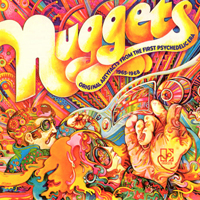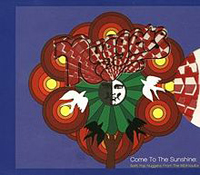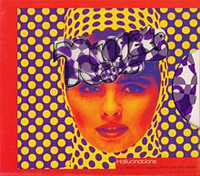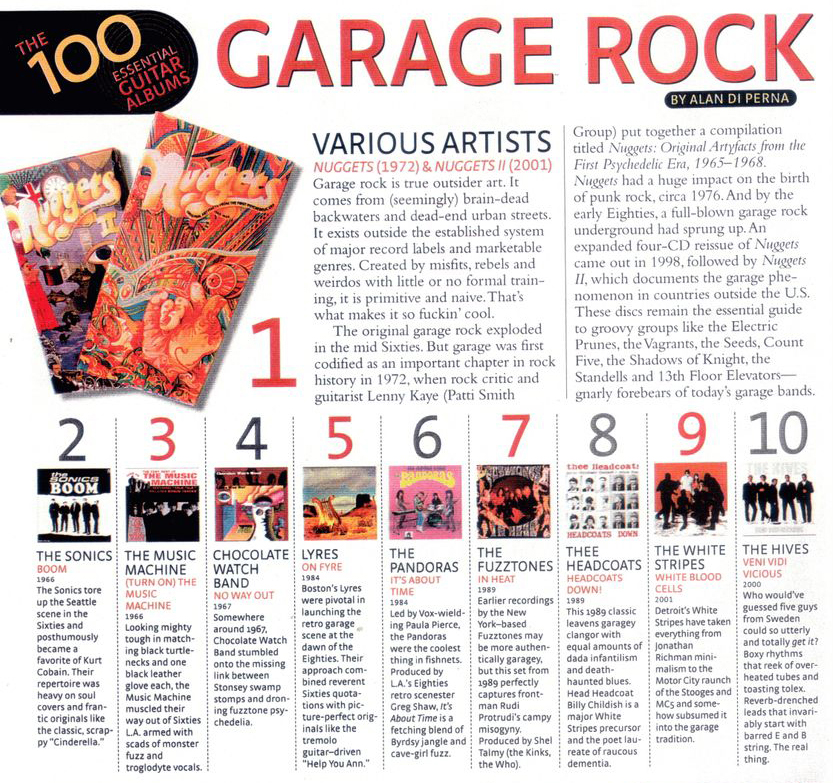Discography >>
REISSUES

Nuggets: Original Artyfacts from the First Psychedelic Era,
1965–1968
RELEASE DATE >> 1998
FORMATE >> CD Reissue
FEATURES >> DISC 2 featured "Talk Talk" by The Music Machine
MORE >> In the mid-to-late 1980s, Rhino released a series of fifteen albums that bore the Nuggets name. The first twelve of these albums each focused on either a specific garage-rock sub-genre or location, while the last three took a more global approach. This series provided much of the source material for the box set.
"It came to me that no one but God can deliver the heart to its dreams."
- Sean Bonniwell

Come to the Sunshine: Soft Pop Nuggets from the WEA Vaults
RELEASE DATE >> 2004
FORMATE >> CD Reissue
FEATURES >> "Discrepancy" by The Bonniwell Music Machine
MORE >> Come to the Sunshine: Soft Pop Nuggets from the WEA Vaults is a 2004 compilation album released by Rhino Handmade, one of two new compilations using the Nuggets name.

Hallucinations: Psychedelic Pop Nuggets from the WEA Vaults
RELEASE DATE >> 2004
FORMATE >> CD Reissue
FEATURES >> "Astrologically Incompatible" by The Bonniwell Music Machine
MORE >> Hallucinations: Psychedelic Pop Nuggets from the WEA Vaults is a 2004 compilation album released by Rhino Handmade, one of two new compilations using the Nuggets name. As with all Rhino Handmade releases, it was only available online, and a limited amount of copies were pressed. All 7500 copies are currently sold out.
REVIEW>> by Steve Morse, The Boston Globe, September 18, 1998
TERMS & CONDITIONS | Site by:
Copyright © 2012 Uncle Helmet's Music, LLC. All Rights Reserved.
Garage-rock. Garage-punk. Garage-psychedelia. Call it what you want, but the operative word was garage. It was music often literally made in suburban garages during the '60s, in the wake of the Beatles-led British Invasion. And it birthed a renaissance that made instant heroes out of many regional bands rarely heard from again, while paving the way for the do-it-yourself ethic of today's alternative-rock nation.
Think of the Beau Brummels from San Francisco, the Music Machine from Los Angeles, Barry & the Remains from Boston, the Cryan Shames from Chicago, the Amboy Dukes from Detroit, the Nazz from Philadelphia.
These are just a few of the bands represented on the new four-CD box "Nuggets: Original Artyfacts from the Psychedelic Era, 1965-1968" on Rhino Records. It's an expanded version of the original "Nuggets" disc released in 1972, which spawned the compilation/reissue craze so prevalent in retailing today.
There was no shortage of American acts unashamedly jumping on the Beatles bandwagon. "In 1964, when the Beatles came out, I saw exactly what was going to happen," says Sean Bonniwell, singer with the Music Machine, which has two songs on the "Nuggets" box: "Talk Talk" and "Double Yellow Line."
The Music Machine, however, became one of the most original garage-rock groups of that time. The band rode the songwriting genius of Bonniwell, who was ahead of his time in protest songs like "Eagle Never Hunts the Fly" (about government hassling) and "Mother Nature, Father Earth" (about ecology). They also had the technical genius of bassist Keith Olsen, who invented the "fuzzbox," which created a trippy guitar sound that revolutionized the genre. The group split up in 1969, but Olsen later became a prominent producer whose chief credit was Fleetwood Mac's mega-platinum "Rumours" album.
Bonniwell, unfortunately, was not as lucky. Today, he lives in a garage on an Arabian horse ranch in the small California town of Porterville (between Bakersfield and Fresno). The garage has no running water (he does have access to the main ranch house for that) and he's fighting legal battles to recoup his song- writing royalties from the Music Machine's record label, Original Sound.
Clearly, the euphoria of the mid-'60s has given way to a harsher reality in his case. "I'm just trying to survive," says Bonniwell, who is finishing an autobiography, "Beyond the Garage," which he expects to put out by himself for Christmas. (For more info, write to PO Box 409, Porterville, CA. 93258.)
Bonniwell is now a born-again Christian who is trying to deal with his anger over his perceived mistreatment by his label. "The Lord says I must forgive my enemies," he says.
He still sounds full of life, though, and is still writing songs. "I never stopped writing," he notes, adding that he even has three albums' worth of unrecorded material from the Music Machine days.
And what heady days those were, he recalls. The Music Machine once played 35 nights in a row. "You just threw everything in your VW bus and off you went," he says. "We'd play almost anywhere, any time, but our resources were never coordinated at all. That, and the fact that we rarely got paid. You couldn't take a check from a promoter back then, because it would bounce. So I'd have a big brown shopping bag and take the cash from the door."
Although the Music Machine had a druggy, psychedelic sound, Bonniwell says he didn't do drugs and was "as straight as an ice cube tray." But the group was radical in other ways. In order to stand out from the garage-rock pack, the Music Machine dressed all in black, complete with dyed black hair and black guitars, amps, and drums. They even wore a black leather glove on one hand (this was long before Michael Jackson's single-glove look), all of which conspired to get them into trouble when touring backwater spots in, say, the Deep South.
"I went into one place in the South and wanted to use the restroom," Bonniwell relates. "And this was still in the days when there was segregation. The owner said, 'The white restroom is here, the black restroom is there, and you ain't got one.' "
While many of the acts on the "Nuggets" box turned out to be one-hit wonders, there's still a spirit that makes this one of the most essential collections to any rock historian's library. The suggested retail price is not cheap ($ 59.98), but it's a bargain considering there are nearly 30 songs per CD.

